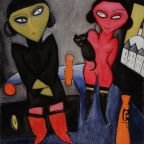Armand Bouten (1893-1965)
dal 7/11/2008 al 28/2/2009
Segnalato da
7/11/2008
Armand Bouten (1893-1965)
Groninger Museum, Groningen
Art makes itself. In this exhibition, the Groninger Museum will display a selection of the Dutch expressionist's best works by means of which, in conjunction with the first monograph on the artist, an accurate picture of his life and the development of his oeuvre can be given. The themes of his paintings were in general farmers and labourers in Dutch landscapes, gypsies, fairgrounds, bars and brothels.

In the autumn of 2008, the Groninger Museum will present the first large-scale exhibition of the work of the Dutch expressionist Armand Bouten (1893-1965). In this exhibition, the Groninger Museum will display a selection of Bouten's best works by means of which, in conjunction with the first monograph on the artist, an accurate picture of his life and the development of his oeuvre can be given.
Armand Bouten was born in Venlo in 1893. At the age of 21 he moved to Amsterdam, where he studied at the State Art Teachers’ Training College (Rijks Normaalschool voor Tekenonderwijs). He married Hanny Korevaar in 1922; they went to southern Europe on honeymoon. They lived in turn in Paris, Budapest, and Brussels, and for shorter periods in Amsterdam and The Hague. Completely penniless, they returned to the Netherlands in 1953, and lived out their lives in solitude in Amsterdam.
From his first trip to southern Europe onward, Bouten’s early cubist-expressionist style was to change: bright colours and strong contours appeared in his work. His early topics, such as farmers and labourers in Dutch landscapes, also changed during his travels: gypsies, fairs, cafes, and brothels made their appearance in his work. Horrendous images, painted in dark, sombre colours subsequently betrayed the rising political tension in Europe, in the build-up to the Second World War.
After WWII, he turned out a few paintings and coloured gouaches, and drawings in pen and ink on paper, usually of Amsterdam prostitutes and city views. The Groninger Museum presents an overview of the work of this artist, hitherto unknown to the general public, in whom expressionism was so deeply ingrained.
Groninger Museum
Museumeiland 1- Groningen
Hours of opening: Tuesday to Sunday, and on public holidays from 10.00-17.00. Open until 22.00 on Fridays. Closed on Mondays, and on 25 December and 1 January.



